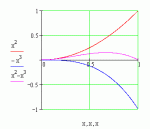Howdy,
This is my first post. So, howdy!
I'm currently in advance Calculus I and am currently having some homework issues.
Prove or disprove: If A is a subset of R (real #s) and f,g : A -> R are monotone, then f + g is monotone.
Now, proofs are not my cup of tea, but being a math major, I must understand and be able to read/write them without any hassle. So far, I have the definition of monotone, which is:
Suppose A belongs to R and f : A -> R,
- We say that f is monotone increasing if x1, x2 belong to A and x1 <= x2, then f(x1) <= f(x2).
- We say that f is monotone decreasing if x1, x2 belong to A and x1 >= x2, then f(x1) >= f(x2).
- We say that f is strictly monotone increasing if x1, x2 belong to A and x1 < x2, then f(x1) < f(x2).
- We say that f is strictly monotone decreasing if x1, x2 belong to A and x1 > x2, then f(x1) > f(x2).
Now, I also know that f and g both map elements of A to the R (real #s). I'm just not positive on what to do from here and how I should structure this. Any help would be great. Thanks!
Peace
This is my first post. So, howdy!
I'm currently in advance Calculus I and am currently having some homework issues.
Prove or disprove: If A is a subset of R (real #s) and f,g : A -> R are monotone, then f + g is monotone.
Now, proofs are not my cup of tea, but being a math major, I must understand and be able to read/write them without any hassle. So far, I have the definition of monotone, which is:
Suppose A belongs to R and f : A -> R,
- We say that f is monotone increasing if x1, x2 belong to A and x1 <= x2, then f(x1) <= f(x2).
- We say that f is monotone decreasing if x1, x2 belong to A and x1 >= x2, then f(x1) >= f(x2).
- We say that f is strictly monotone increasing if x1, x2 belong to A and x1 < x2, then f(x1) < f(x2).
- We say that f is strictly monotone decreasing if x1, x2 belong to A and x1 > x2, then f(x1) > f(x2).
Now, I also know that f and g both map elements of A to the R (real #s). I'm just not positive on what to do from here and how I should structure this. Any help would be great. Thanks!
Peace

